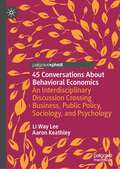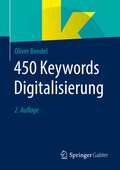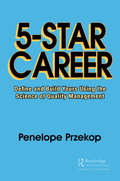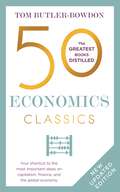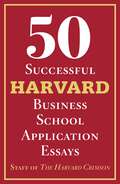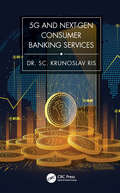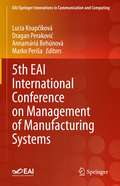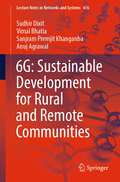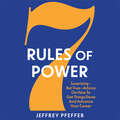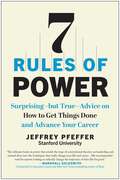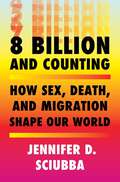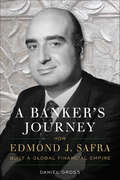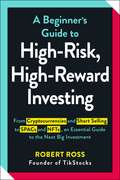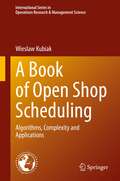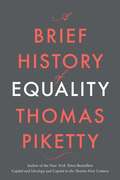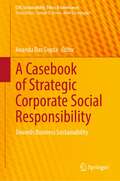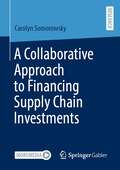- Table View
- List View
401(k)s & IRAs For Dummies
by Ted BennaFrom the basics down to investing, get the most out of your 401(k) and IRA in any economic environment When you’re ready to start setting aside (or withdrawing) money for your retirement—whenever that might be—401(k)s & IRAs For Dummies is here for you! It covers both types of retirement plans because they each have valuable tax benefits, and you may be able to contribute to both at the same time. With the practical advice in this book, you learn how to manage your accounts, minimize your investment risk, and maximize your returns. Sounds like a win-win, no matter your situation or where you’re at in life. Written by a well-known expert and ‘father of the 401 (k)’ , Ted Benna, 401(k)s & IRAs For Dummies helps you keep up with the ever-changing rules surrounding both retirement plans—including the rules from the SECURE and CARES Acts—and avoid the mistakes that can lead to higher taxes and penalties. Additional topics include: Tax strategies before and after retirement Required distributions and how much you need to take Penalties for taking money out early and how to avoid them What happens to your or your spouse’s retirement plan after death or divorce The rules for taking money out of an inherited plan Methods for calculating required minimum distributions Special tax benefits for conversions to Roth IRAs How to recharacterize IRA or Roth contributions Why IRA based plans are a better options for many small employers Helping solo entrepreneurs and other small businesses pick the right type of plan Whether you’re just starting to think about a retirement plan, planning when to retire, or you’re facing retirement, you’ll find useful and practical guidance in 401(k)s & IRAs For Dummies. Get your copy today!
440 Keywords Außenwirtschaft
by Springer Fachmedien WiesbadenVon Abwehrzoll über Freihandelszone bis zu TTIP: Begriffe zum Thema Außenhandel zeichnen sich durch unzählige Fachtermini und Abkürzungen aus. Das vorliegende Nachschlagewerk eignet sich für den ersten schnellen Überblick. In 440 übersichtlichen Schlüsselbegriffen werden unter anderem grundlegende Konzepte, Institutionen und Abkommen erläutert. Die Erklärungen sind kompakt und verständlich formuliert und bieten Basiswissen für alle, die einen schnellen Einstieg in das Thema Europa suchen, einzelne Begriffe nachschlagen oder ihr vorhandenes Wissen auffrischen möchten.
45 Conversations About Behavioral Economics: An Interdisciplinary Discussion Crossing Business, Public Policy, Sociology, and Psychology
by Li Way Lee Aaron KeathleyThe hallmark of this book is its conversational format. The conversations are organic: no jargons, no additives such as equations and tables. Each conversation comes in bite-size, taking no more than ten minutes to digest.
450 Keywords Digitalisierung
by Oliver BendelVon „Big Data“ über die „Künstliche Intelligenz“ bis hin zur „Sozialen Robotik“: Im Kontext der Digitalisierung gibt es unzählige Fachtermini. Das vorliegende Nachschlagewerk ist für alle geeignet, die einen schnellen Einstieg in das Gebiet der Digitalisierung suchen und sich für Fragen der Ethik interessieren. In 350 übersichtlichen Beiträgen werden die Grundlagen und Entwicklungen leicht verständlich erläutert.
450 MHz – Frequenz für kritische Infrastrukturen: Vorteile und Nutzen für Versorgungsunternehmen (essentials)
by Marcel Linnemann Alexander Sommer Ralf Leufkes Robin BrockmannDie Sicherstellung einer zuverlässigen Versorgungsinfrastruktur zur Gewährleistung der Versorgungssicherheit stellt eines der zentralen Themen der Energieversorger in Deutschland dar. Einen wichtigen Beitrag soll hierfür die 450 MHz Frequenz als Frequenz für kritische Infrastrukturen leisten. Für Energieversorger stellt sich daher die Frage, in welchem Kontext die 450 Frequenz zu nutzen ist sowie welche Vor- und Nachteile 450 MHz mit sich bringt.Die Kurzfassung zum Thema 450 MHz – die Frequenz für kritische Infrastrukturen soll dem Leser einen ersten schnellen Einstieg in die energiewirtschaftliche Einordnung, die Frequenz und darauf basierende Technologie sowie die Einsatzmöglichkeiten im eigenen Energieversorgungsunternehmen bieten.
5-Star Career: Define and Build Yours Using the Science of Quality Management
by Penelope PrzekopIndustries across the globe manufacture products and provide services that you deem 5-star worthy; their goal is to satisfy your needs and desires. They follow the proven science of quality management to make that happen because it is common sense, and its effectiveness is irrefutable. 5-Star Career: Define and Build Yours Using the Science of Quality Management provides common-sense, strategic context for personally implementing quality concepts that reflect your goals as well as your own definition of a 5-star life and career. This book provides the following benefits: Explains how the science of quality management can ensure customer satisfaction, which is what industry uses to gauge the quality of products and services. Relates that explanation to you on a personal level including how the basic concepts and components of the science apply to your career/job, the path it has taken, and can take. Challenges you to identify your authentic needs and desires following the thorough process, research methodology, and data analysis corporations rely on to understand their customers. It tells you how to do all of that, and provides a unique tool to help you gather and analyze the right type of data and information. Clarifies the critical role that controlled systems and processes play in the science of quality management, the role they play in the personal application of quality management, and their surprising power to ensure intended outcomes. Explains how to apply the proven decision-making methodology (used by industry) to identify the best possible process that leads to the career you deem as 5-star worthy, and to address the career elements that will satisfy your authentic needs and desires. Relays how risk-based decision-making is key not only to identifying a process that ensures success but also to addressing the unexpected curveballs that will surely come your way. Penelope Przekop built a 30-year career around the science of quality management while struggling to overcome the uniquely disturbing childhood she shared with her brother. Along the way, she internalized the science used to build quality into products and services and discovered how it can be personally applied to build and manage not only the quality of a career but also the quality of a life.
50 Economics Classics: Revised Edition, Your shortcut to the most important ideas on capitalism, finance, and the global economy
by Tom Butler-BowdonEconomics drives the modern world and shapes our lives, but few of us feel we have time to engage with the breadth of ideas in the subject.50 Economics Classics is the smart person's guide to two centuries of discussion of finance, capitalism and the global economy. From Adam Smith's Wealth of Nations to Thomas Piketty's bestseller Capital in the Twenty-First Century, here are the great reads, seminal ideas and famous texts, clarified and illuminated for all. The revised edition will: · include 5-6 new titles addressing some more up to date areas of the subject such as The Bitcoin Standard, The Age of Surveillance Capitalism and Discrimination and Disparities · have a revised introduction to reflect on the current turbulence and challenges facing the global economy over the next decade · have some of the less relevant titles removed 'Something of a modern classic in its own right.'E&T magazine'50 Economics Classics is a celebration of the large imaginative canvasses of the great economists. Butler-Bowdon's choices are broad, interdisciplinary and compellingly idiosyncratic. His chapters are not simply straight summaries of the chosen works, but thoughtful reflections on why we should care about this or that book and what its relevance is for us today. Butler-Bowdon's renderings are done so well that one might never bother going back to the original! Professional economists, students and general readers alike will find much here to delight in and many new byways to explore.'Niall Kishtainy, Fellow in Economic History, London School of Economics
50 Successful Harvard Business School Application Essays: With Analysis by the Staff of The Harvard Crimson
by Staff of the Harvard CrimsonFifty all-new essays that got their authors into Harvard Business School, including GMAT scores, showing what worked, what didn’t, and how you can do it too. <p><p> Competition to get into the nation’s top business schools has never been more intense. Harvard Business School in particular draws thousands of elite applicants from around the world. As admissions departments become increasingly selective, even the best and brightest need an edge. <p><p> Writing a personal statement is a daunting part of the application process. In a specific amount of characters, applicants must weave together experiences and passions into a memorable narrative to set them apart from thousands of other applicants. While there is no magic formula for writing the perfect essay, picking up this book will put them on the right track. <p><p> The Staff of the Harvard Crimson's 50 Successful Harvard Business School Application Essays includes fifty standout essays from students who successfully secured a spot at Harvard Business School. Each student has a unique set of experiences that led them to applying for an MBA. Each essay includes analysis by Crimson editors on essay qualities and techniques that worked, so readers can apply them to their own writing. <p><p> This book will aid applicants in composing essays that reveal their passion for business and the discipline they will bring to this demanding program and profession. It will give them the extra help they need to get into the best business school programs in the world.
5G and Next-Gen Consumer Banking Services
by Krunoslav Ris, PhDThe future has already begin. The banking industry needs to adjust, or it will disappear in the next decade. With the help of 5G, next-generation intelligent ATM-like devices will have highly integrated functions and use technologies such as artificial intelligences-assisted self-service contactless interfaces with facial recognition and digital signatures. This book focuses on new experiences that clients can expect when connected to a 5G network with a 5G device. By 2022 we hope that 5G will: Drive accelerated mBanking growth Power augmented reality /virtual reality Make Video shopping experiences more widespread and compelling Enable banks to deploy highly personalized customer service experiences Support time-sensitive banking applications, like online stock trading where milliseconds can determine a gain or loss Improve security and fraud prevention bycomputing and exchanging more data traveling between parties in real-time Enhance mPOS transactions and utilization. 5G holds the potential to accelerate mobile point of sale (MPOS) transaction processing time and improve connectivity In order to explore these topics, this book covers: • Decentralization of the banks • Banking without banks • 5G will change the modern banking industry • Blockchain adoption by the banking industry
5th EAI International Conference on Management of Manufacturing Systems (EAI/Springer Innovations in Communication and Computing)
by Lucia Knapčíková Dragan Peraković Marko Periša Annamária BehúnováThe book presents the proceedings of the 5th EAI International Conference on Management of Manufacturing Systems (MMS 2020), which took place online on October 27-29, 2020. The conference covers the management of manufacturing systems with support for Industry 4.0, logistics and intelligent manufacturing systems and applications, cooperation management, and its effective applications. Topics include RFID applications, economic impacts in logistics, ICT support for Industry 4.0, industrial and smart Logistics, intelligent manufacturing systems and applications, and much more. The topic is of interest to researchers, practitioners, students, and academics in manufacturing and communications engineering.
6G: Sustainable Development for Rural and Remote Communities (Lecture Notes in Networks and Systems #416)
by Sudhir Dixit Vimal Bhatia Sanjram Premjit Khanganba Anuj AgrawalThe book covers a variety of feasible technology options, both wired and wireless, to enable 6G connectivity in rural and remote regions. Along with the enabling technology options, the book also covers important aspects such as human-computer interaction, business models for the local operator ecosystem, regulatory and right-of-way policies, security and privacy, and future challenges related to technology migration, urbanization, and scalability. A special feature of this book is that it covers both the optical and wireless technology aspects to realize 6G connectivity, which will be of interest to a broad range of researchers and practitioners. Detailed figures have been included in the book to cover both the fiber-optics and wireless aspects. These figures include telecommunication equipment and networks ranging from a locality to the under-sea cables to high latitude platforms. The book has simple explanations, pictorial representations, minimal math, and conversational language, which will enable all the readers to grasp it, thereby helping them in decision making and performing comprehensive analysis. This book includes the needs of the unconnected and under-connected sections of the society, notably from the rural and remote areas, when the 6G standards are being discussed and developed. This feature will help overcome the challenge of widening the digital divide from every new generation of mobile network standards. Hence, the book covers all technical and non-technical aspects to be of interest to researchers, decision-makers, academia, social workers, and the readers in technology, growth, and empowerment.
7 Rules of Power: Surprising- But True- Advice on How to Get Things Done and Advance Your Career
by Jeffrey PfefferIf you want to 'change lives, change organizations, change the world,' the Stanford business school's motto, you need power.Is power the last dirty secret or the secret to success? Both. While power carries some negative connotations, power is a tool that can be used for good or evil. Don't blame the tool for how some people used it.Rooted firmly in social science research, Pfeffer's 7 rules provide a manual for increasing your ability to get things done, including increasing the positive effects of your job performance.With 7 Rules of Power, you'll learn, through both numerous examples as well as research evidence, how to accomplish change in your organization, your life, the lives of others, and the world.
7 Rules of Power: Surprising--but True--Advice on How to Get Things Done and Advance Your Career
by Jeffrey PfefferIf you want to "change lives, change organizations, change the world," the Stanford business school&’s motto, you need power. Is power the last dirty secret or the secret to success? Both. While power carries some negative connotations, power is a tool that can be used for good or evil. Don&’t blame the tool for how some people used it. If fully understood and harnessed effectively, power skills and understanding become the keys to increasing salaries, job satisfaction, career advancement, organizational change, and, happiness. In 7 Rules of Power, Jeffrey Pfeffer, professor of organizational behavior at the Stanford University Graduate School of Business, provides the insights that have made both his online and on-campus classes incredibly popular—with life-changing results often achieved in 8 or 10 weeks. Rooted firmly in social science research, Pfeffer&’s 7 rules provide a manual for increasing your ability to get things done, including increasing the positive effects of your job performance. The 7 rules are: 1) Get out of your own way. 2) Break the rules. 3) Show up in powerful fashion. 4) Create a powerful brand. 5) Network relentlessly. 6) Use your power. 7) Understand that once you have acquired power, what you did to get it will be forgiven, forgotten, or both. With 7 Rules of Power, you&’ll learn, through both numerous examples as well as research evidence, how to accomplish change in your organization, your life, the lives of others, and the world.
8 Billion and Counting: How Sex, Death, and Migration Shape Our World
by Jennifer D. SciubbaA provocative description of the power of population change to create the conditions for societal transformation. As the world nears 8 billion people, the countries that have led the global order since World War II are becoming the most aged societies in human history. At the same time, the world’s poorest and least powerful countries are suffocating under an imbalance of population and resources. In 8 Billion and Counting, political demographer Jennifer D. Sciubba argues that the story of the twenty-first century is less a story about exponential population growth, as the previous century was, than it is a story about differential growth—marked by a stark divide between the world’s richest and poorest countries. Drawing from decades of research, policy experience, and teaching, Sciubba employs stories and statistics to explain how demographic trends, like age structure and ethnic composition, are crucial signposts for future violence and peace, repression and democracy, poverty and prosperity. Although we have a diverse global population, demographic trends often follow predictable patterns that can help professionals across the corporate, nonprofit, government, and military sectors understand the global strategic environment. Through the lenses of national security, global health, and economics, Sciubba demonstrates the pitfalls of taking population numbers at face value and extrapolating from there. Instead, she argues, we must look at the forces in a society that amplify demographic trends and the forces that dilute them, particularly political institutions, or the rules of the game. She shows that the most important skills in demographic analysis are naming and being aware of your preferences, rethinking assumptions, and asking the right questions. Provocative and engrossing, 8 Billion and Counting is required reading for business leaders, policy makers, and anyone eager to anticipate political, economic, and social risks and opportunities. A deeper understanding of fertility, mortality, and migration promises to point toward the investments we need to make today to shape the future we want tomorrow.
A 1.778 km de distancia. Cómo cuidar las relaciones en un mundo online
by Ferran Ramón-CortesDel autor de La isla de los 5 faros, con más de 100.000 ejemplares vendidos. Ferran Ramon-Cortés nos ofrece las claves para mejorar la comunicación virtual, fortalecer las relaciones y reconectar a las personas en un mundo online. Tras más de ocho horas enlazando videoconferencias, Ferran acaba una nueva jornada exhausto y frustrado. Recibe entonces un misterioso mensaje: «Apreciado Ferran: (...) desde hace más de un año estoy sumergido en la nueva comunicación virtual; vivo permanentemente conectado a mi familia, a mis amigos y a todo mi entorno, pero cada día me siento más alejado de todos y del mundo. (...) no sé si darle las gracias a esa nueva comunicación virtual o culparla de todo lo que me pasa. (...) Lo que es seguro es que busco respuestas. ¿Las tienes tú?». Acompañado de su fiel perra Nim, Ferran se embarcará en un nuevo viaje con la intención de encontrar respuesta a cinco preguntas clave: - ¿Funciona la comunicación online?- ¿Cómo afecta la comunicación virtual a nuestras relaciones?- ¿Trabajar online es una opción?- ¿Cómo podemos comunicarnos mejor online?- ¿Cómo podemos relacionarnos mejor (punto)? Una reflexión calmada, basada en investigaciones pioneras, en torno a los retos y las oportunidades de la comunicación virtual para las relaciones de hoy.
A Banker's Journey: How Edmond J. Safra Built a Global Financial Empire
by Daniel GrossWho was Edmond J. Safra? “The greatest banker of his generation,” in the estimation of a former World Bank President. The founder of four massive financial institutions on three continents, and a proud child of Beirut’s Jewish quarter. An innovative avatar of financial globalization, and a faithful heir to a tradition of old-world banking. The leading champion and protector of the Sephardic diaspora. In A Banker’s Journey, financial journalist and historian Daniel Gross, who, like Safra, traces his heritage to Aleppo, Syria, reconstructs the public life of an intensely private man. With exclusive access to Safra’s personal archives, Gross tracks the banker’s remarkable journey from Beirut to Milan, São Paulo, Geneva, and New York—to the pinnacle of global finance. Edmond Safra was fifteen in 1947, when his father sent him to establish a presence in Milan, Italy. Fluent in six languages, and with an eye for value, managing risk, and personal potential, Safra was in perpetual motion until his tragic death in 1999. The modern, global financial empire he built was based on timeless principles: a banker must protect his depositors and avoid excessive leverage and risk. In an age of busts and bailouts, Safra posted remarkable returns while rarely suffering a credit loss. From a young age, Safra assumed the mantle of leadership in the Syrian-Lebanese Jewish community, providing personal aid, supporting the communities that formed in exile, and championing Sephardic religious and educational efforts in Israel and around the world. Edmond J. Safra’s life of achievement in the twentieth century offers enduring lessons for those seeking to make their way in the twenty-first century. He inspired generations to make the world a better place.
A Beautiful Way to Coach: Positive Psychology Coaching in Nature
by Fiona ParasharLeaders need to renew and recharge regularly to lead more effectively. Forget the squeezed hour of coaching on Zoom or in a busy office – this book invites coaches and leaders alike to re-energise their style of executive coaching by stepping beyond traditional techniques and out of the office for an executive day retreat. Based on the award-winning framework of the Positive Vision Day programme, this accessible book introduces a new approach to coaching, combining time-out in a natural and beautiful setting with positive psychology. The book is designed to inspire coaches and leaders to take a day away from the desk, step into nature and renew their energy and purpose. As a coach, you are needed more than ever to help leaders align their strengths and values to their personal vision. This book does just that, and provides: Detailed exercises linking psychological underpinnings to the goals of each exercise, including how to avoid classic coaching pitfalls. Journaling prompts for self-reflection and self-coaching. Easy-to-understand models, templates, scripts and action steps for every stage of the process. The approach used in the book will be of particular interest to not only leadership and executive coaches, and internal executive coaches, but also career, entrepreneurship, business, wellbeing and life coaches, as well as leaders themselves who are mid-career or at a career or psychological crossroads.
A Beginner's Guide to High-Risk, High-Reward Investing: From Cryptocurrencies and Short Selling to SPACs and NFTs, an Essential Guide to the Next Big Investment
by Robert RossMake the best choices for your money and earn big with this guide to high-risk, high-reward investment strategies including options trading, investing in meme stocks, and the business of cryptocurrency.Your favorite sites are filled with the latest investment trends and stories of other people making bank by making smart moves in the market. But how can you get your own share of the wealth? A Beginner&’s Guide to High-Risk, High-Reward Investing can help you make sense of trends, from short selling to cryptocurrency and &“meme stock,&” breaking down the buzzwords to give you hard facts about the opportunities and risks of fringe investment strategies. With advice from expert Robert Ross, this easy-to-follow investing guide gives you everything you need to determine which high-risk, high-reward investment strategies are the best fit for your portfolio.
A Beginner's Guide to Structural Equation Modeling
by Tiffany A. Whittaker Randall E. SchumackerA Beginner’s Guide to Structural Equation Modeling, fifth edition, has been redesigned with consideration of a true beginner in structural equation modeling (SEM) in mind. The book covers introductory through intermediate topics in SEM in more detail than in any previous edition. All of the chapters that introduce models in SEM have been expanded to include easy-to-follow, step-by-step guidelines that readers can use when conducting their own SEM analyses. These chapters also include examples of tables to include in results sections that readers may use as templates when writing up the findings from their SEM analyses. The models that are illustrated in the text will allow SEM beginners to conduct, interpret, and write up analyses for observed variable path models to full structural models, up to testing higher order models as well as multiple group modeling techniques. Updated information about methodological research in relevant areas will help students and researchers be more informed readers of SEM research. The checklist of SEM considerations when conducting and reporting SEM analyses is a collective set of requirements that will help improve the rigor of SEM analyses. This book is intended for true beginners in SEM and is designed for introductory graduate courses in SEM taught in psychology, education, business, and the social and healthcare sciences. This book also appeals to researchers and faculty in various disciplines. Prerequisites include correlation and regression methods.
A Biophilic Design Guide to Environmentally Sustainable Design Studios (SpringerBriefs in Education)
by Lina Markauskaite Arianna Brambilla Niranjika WijesooriyaThis book explores the current challenges of teaching biophilic design within environmentally sustainable design (ESD) education. It shows how design frameworks and success matrices can be used within ESD education, explores the development of biophilic design frameworks and shows how design thinking can be used to adopt biophilic design within ESD education. It introduces the new 'Process Bridging Technique (PBT)' that can be used to generate sustainable design frameworks able to fulfil the requirements of a performance-based approach and, at the same time, enhance human-nature connectedness. Based on an educational design research project developed in the past two years at the University of Sydney, this book informs new approaches to ESD education and bridges the spheres of research, education, and profession. It serves as a practical guide on how to systematically develop a design framework that can be used in architecture education, while presenting the pioneering 'Process Bridging Technique' developed by the authors.
A Book of Open Shop Scheduling: Algorithms, Complexity and Applications (International Series in Operations Research & Management Science #325)
by Wieslaw KubiakThis book provides an in-depth presentation of algorithms for and complexity of open shop scheduling. Open shops allow operations of a job to be executed in any order, contrary to flow and job shops where the order is pre-specified. The author brings the field up to date with more emphasis on new and recent results, and connections with graph edge coloring and mathematical programming. The book explores applications to production and operations management, wireless network scheduling, and timetabling. The book is addressed to researchers, graduate students, and practitioners in Operations Research, Operations Management, computer science and mathematics, who are developing and using mathematical approaches to applications in manufacturing, services and distributed wireless network scheduling.
A Brief History of Equality
by Thomas PikettyThe world’s leading economist of inequality presents a short but sweeping and surprisingly optimistic history of human progress toward equality despite crises, disasters, and backsliding. A perfect introduction to the ideas developed in his monumental earlier books. It’s easy to be pessimistic about inequality. We know it has increased dramatically in many parts of the world over the past two generations. No one has done more to reveal the problem than Thomas Piketty. Now, in this surprising and powerful new work, Piketty reminds us that the grand sweep of history gives us reasons to be optimistic. Over the centuries, he shows, we have been moving toward greater equality. Piketty guides us with elegance and concision through the great movements that have made the modern world for better and worse: the growth of capitalism, revolutions, imperialism, slavery, wars, and the building of the welfare state. It’s a history of violence and social struggle, punctuated by regression and disaster. But through it all, Piketty shows, human societies have moved fitfully toward a more just distribution of income and assets, a reduction of racial and gender inequalities, and greater access to health care, education, and the rights of citizenship. Our rough march forward is political and ideological, an endless fight against injustice. To keep moving, Piketty argues, we need to learn and commit to what works, to institutional, legal, social, fiscal, and educational systems that can make equality a lasting reality. At the same time, we need to resist historical amnesia and the temptations of cultural separatism and intellectual compartmentalization. At stake is the quality of life for billions of people. We know we can do better, Piketty concludes. The past shows us how. The future is up to us.
A Casebook of Strategic Corporate Social Responsibility: Towards Business Sustainability (CSR, Sustainability, Ethics & Governance)
by Ananda Das GuptaThis casebook argues that corporate sustainability agendas should look beyond stakeholder demands and desires, towards strategic opportunities to achieve social and commercial benefits simultaneously. It encourages shifting focus from a strategic approach to a sustainable business practice. As the cases in the book highlight, it is in every company’s best interest to identify a manageable number of sustainability initiatives whose shared benefits—for society at large and the company—are significant and also substantially help the company strategically position itself in the competitive marketplace. Strategic sustainable business practices can lead to shared value creation, strengthening the company’s competitiveness and establishing a symbiotic relationship. Companies can achieve solid profits by doing good things for the environment; it is a “win-win” for society and for business. This casebook provides examples of multi-stakeholder partnerships that aim to create sustainable enterprises. Ideal for teaching purposes, after a brief introduction to the case method, the cases are presented with no comments or criticisms.
A Collaborative Approach to Financing Supply Chain Investments
by Carolyn SomorowskyCompetitive advantage is not achieved by a single company, but rather by the entire supply chain, with a focus on improving the flow of information, finance and goods. Improving these flows requires strategic investments relevant to the supply chain that are often long-term, capital-intensive, relationship-specific, and therefore risky. The past financial or COVID-19 crisis has made banks more risk averse, making it more expensive for supply chain members to finance risky investments or even more difficult to raise funds from external financial institutions. Supply chain finance is a young discipline that focuses on improving financial flows through a collaborative approach. Since most strategic investments are made by suppliers facing financial constraints, there is a high likelihood that supply chain disruptions will occur because the financing party becomes insolvent, or the investments do not materialize. To encourage strategic investments and avoid supply chain disruptions, a model is developed in which supply chain members leverage their financial and operational capabilities to realize these investments and share costs, risks, and benefits according to their contribution. The proposed model is based on a structured coalition game with transferable utility that determines the supply chain members best able to finance the investments without compromising supply chain stability.
A Comparative Study of Islamic Finance in Australia and the UK (Islamic Business and Finance Series)
by Imran LumThis book provides valuable insights into the practical challenges faced by the nascent Islamic finance industry and compares the Australian experience to developments in the UK. It contributes to a greater understanding of how Muslims living as a minority in Australia and the UK negotiate Islamic doctrine in secular societies by focusing on one aspect of this negotiation, namely the prohibition of ribā. There is little debate in the Islamic tradition on the prohibition of ribā. The differences, however, lie in the interpretation of ribā and the question of how Muslims live in a society that is heavily reliant on interest and conventional banking, yet at the same time adhere to Islamic guidelines. Through the words of religious leaders, Muslim professionals and university students, Imran Lum provides real accounts of how Muslims in Australia and the UK practically deal with conventional banking and finance products such as home loans, savings accounts and credit cards. He also explores Muslim attitudes towards Islamic finance and queries whether religion is the sole determining factor when it comes to its uptake. Drawing on his own unique experience as a practitioner responsible for growing an Islamic business in a conventional bank, Lum provides a firsthand account of the complexities associated with structuring Islamic finance products that are not only sharia compliant but also competitive in a non-Muslim jurisdiction. Using ṣukūk bonds as a case study, he highlights the tangible and non-tangible barriers to product development, such as tax and regulatory requirements and the rise of Islamophobia. Combining academic and industry experience, Lum unpacks the relationship of Islamic finance with Muslim identity construction in the West and how certain modalities of religiosity can lead to an uptake of Islamic finance, while others can lead toits rejection.


